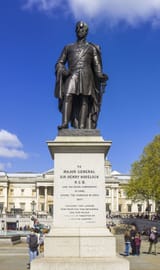Search Results
6/30/2025, 6:01:53 PM
>Hero posting
He joined the Army aged 20 and was sent to India eight years later, but it was struggle for him to reach the top. Despite serving with distinction in the First Anglo-Burmese War (1824-26) and in the First Afghan War (1839-42), he was not able to rise above the rank of captain. Many put this down to his religious upbringing, which caused him to preach regularly to his men - something that did not make him too popular.
The 1850s were better for him. He was promoted to quartermaster-general and then to general. Then, in 1857, the Indian Mutiny broke out.
Indian troops in the British Army were ordered to use cows' and pigs' fat to grease cartridges for their Enfield rifles. Both Muslims and Hindus were deeply offended by the instruction, and mutinied against the dictatorial British rule.
Henry Havelock, and his son Harry, were in Persia at the time. With 1,940 men, they marched towards the town of Cawnpore which had been captured. In nine days in the hottest part of the year, they covered 126 miles - one of the most gruelling forced marches in British history.
Between July 12 and August 16, they fought two pitched battles and seven skirmishes against a native army four times their number, better equipped and fanatically brave. But Havelock won them all, and he became a hero back home for winning victories at a time when the war was going badly.
On September 25, Havelock and just 250 survivors staggered into the town of Lucknow, 45 miles from Cawnpore, to rescue a British garrison that had found itself surrounded.
But now the hero Havelock found himself besieged, as the Indians closed in on him.
However, Havelock's victories had broken the back of the Mutiny and, on November 17, Lucknow was relieved. But it came too late for the hero. A week later, he died of dysentry and was buried beneath a mango tree, unable to collect his knighthood.
He joined the Army aged 20 and was sent to India eight years later, but it was struggle for him to reach the top. Despite serving with distinction in the First Anglo-Burmese War (1824-26) and in the First Afghan War (1839-42), he was not able to rise above the rank of captain. Many put this down to his religious upbringing, which caused him to preach regularly to his men - something that did not make him too popular.
The 1850s were better for him. He was promoted to quartermaster-general and then to general. Then, in 1857, the Indian Mutiny broke out.
Indian troops in the British Army were ordered to use cows' and pigs' fat to grease cartridges for their Enfield rifles. Both Muslims and Hindus were deeply offended by the instruction, and mutinied against the dictatorial British rule.
Henry Havelock, and his son Harry, were in Persia at the time. With 1,940 men, they marched towards the town of Cawnpore which had been captured. In nine days in the hottest part of the year, they covered 126 miles - one of the most gruelling forced marches in British history.
Between July 12 and August 16, they fought two pitched battles and seven skirmishes against a native army four times their number, better equipped and fanatically brave. But Havelock won them all, and he became a hero back home for winning victories at a time when the war was going badly.
On September 25, Havelock and just 250 survivors staggered into the town of Lucknow, 45 miles from Cawnpore, to rescue a British garrison that had found itself surrounded.
But now the hero Havelock found himself besieged, as the Indians closed in on him.
However, Havelock's victories had broken the back of the Mutiny and, on November 17, Lucknow was relieved. But it came too late for the hero. A week later, he died of dysentry and was buried beneath a mango tree, unable to collect his knighthood.
Page 1
